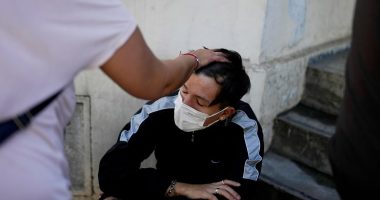
TOKYO—Japan’s economy shrank in the first quarter of 2021 amid a resurgence of Covid-19 infections, but is expected to return to growth as soon as the current quarter with help from manufacturing exports.
The world’s third-largest economy after the U.S. and China contracted an annualized 5.1% in the January-March quarter after growing in the latter half of 2020.
Private spending was down 1.4% from the previous quarter. Shops and restaurants closed or reduced their hours during a government-declared state of emergency in place from January through March in areas including Tokyo and Osaka. It was reimposed in late April. Capital expenditures also declined 1.4% after strong growth in the previous quarter.
Many economists see the downturn as a temporary interruption in the country’s recovery from the pandemic. Japan is benefiting from the comeback in the U.S. and China, its two largest trading partners. Overseas demand for Japanese goods such as cars and electronic parts is growing, helping counterbalance weaker service industries at home such as travel and restaurants.
“Japan still has within itself the power to recover,” Economy Minister Yasutoshi Nishimura said, citing recovering exports. He also said the most recent state of emergency isn’t hitting consumption as hard as before.
Japanese companies forecast industrial output in April would be up 8.4% from the previous month.
Kyoto-based motor maker Nidec Corp. , which has extensive business in China, said it expected sales in the current fiscal year, which ends next March, of $15.6 billion, up from $14.8 billion the previous year. It cited demand for home appliances, computers and videogame consoles.
Toyota Motor Corp. said its net profit increased to $20.6 billion in the year ended March 31, and it forecast a further rise in the current fiscal year, backed by a strong recovery in the U.S. Toyota shares touched a record high in Tokyo trading Tuesday.
Taro Saito, an economist at NLI Research Institute, said he expected the Japanese economy to grow slightly in the April-June quarter despite sluggish consumption. The repeated states of emergency and a slow rollout of Covid-19 vaccinations have kept many shoppers at home.
For department-store operator Isetan Mitsukoshi Holdings Ltd. , the pandemic added to challenges in competing with online stores.
“It is not only the impact of the coronavirus, but the existing business model of department stores no longer works,” said Chief Executive Toshiyuki Hosoya at an earnings news conference on May 12. The company reported a loss of $376 million for the year ended in March.
Watami Co. , one of biggest operators of Japanese-style pubs, also lost money in the year and has asked for investment from the government-backed Development Bank of Japan. The company has closed many of its pubs to comply with the government’s request not to serve alcohol.
“We may have to keep facing the current conditions until next March unless the emergency and vaccination situation improves,” Watami founder Miki Watanabe said.
Write to Megumi Fujikawa at [email protected]
Copyright ©2020 Dow Jones & Company, Inc. All Rights Reserved. 87990cbe856818d5eddac44c7b1cdeb8









